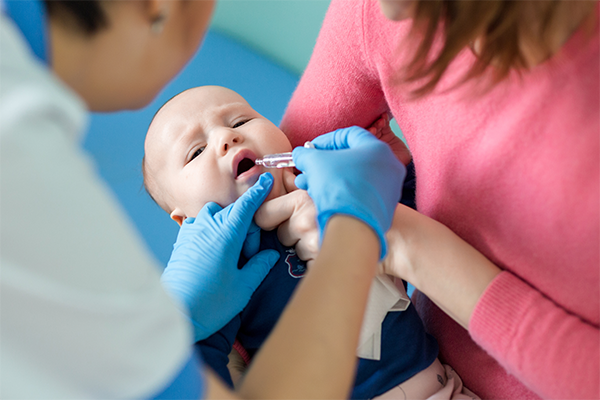
Seeing your child in pain is one of the highest forms of agony parents experience, and when the child is very young or an infant, the pain multiplies. With technological advancements in medical science, doctors have been able to eliminate and cure many common illnesses that infants and kids under the age of 5 suffer, but still, there are some diseases that spread easily and make your child ill and go through unbearable pain. One such contagious infection is Rotavirus.
Rotavirus is a common gastrointestinal infection characterised by inflammation of the stomach and intestines. This blog is a compilation of all the facts that you should know regarding this medical condition, featuring: symptoms, causes, treatment and prevention tips. Scroll till the end to gather the medically accurate information on rotavirus and take timely decisions for faster recovery for your child.
Synopsis
What is Rotavirus Infection, and What Happens if someone is suffering from it?
In simple terms, rotavirus is a type of inflammation that affects your stomach and intestines. It causes damage to the cell lining in the small intestine and hampers nutritional absorption.

Common Rotavirus Infection Symptoms
It becomes much more difficult to timely detect the symptoms in babies, correlate them and report them timely because we are too busy entertaining them so that they stop crying! Whenever you notice excessive crankiness, crying, or a sudden change in behaviour for a day or two, look for cues that your baby might be trying to communicate. There could be an underlying cause of distress. In case of rotavirus, the following are the symptoms you should look for
-
Severe watery diarrhoea
-
Vomiting
-
Stomach pain
-
Dry mouth
-
Less urination
-
Excessive crying
-
Fussiness
Causes of Rotavirus Transmission in Babies
The primary mode of this infection’s transmission is through the faecal-oral route. The virus is present in the stool of the infected person, and due to poor toilet hygiene he/she can become the carrier of this virus for other individuals and kids. When this infected person comes in close contact with the infants or touches the food or water they are consuming, the virus can be transferred to them also.
Rotavirus is highly contagious; hence, it is very important to:
-
Maintain good toilet and general hygiene habits all the time
-
Have kids in your house: you should be extra cautious
-
You must wash your hands thoroughly after using the washroom
-
After changing diapers
-
before and after feeding the baby
-
And also before touching them or holding them in your arms.
Diagnosis and Treatment of Rotavirus
Expert Paediatricians in Patiala might not necessarily go for stool sample testing, as this medical condition is generally diagnosed in the physical examination itself. One of the major symptoms is watery diarrhoea, and evaluation of other symptoms can confirm rotavirus infection.
For treatment, antibiotics are not given as they are not effective in case of rotavirus infection. The treatment majorly focuses on maintaining the water and fluids in the body and avoiding dehydration, which can worsen the situation. The virus usually resolves on its own in 3 to 7 days.
How to Take Care of the Child Suffering from Rotavirus Infection
If you are taking care of your child at your home, these are the following things you can do:
-
Give frequent small portions of food instead of a large meal after a 3-4 hour gap.
-
Keep the fluid intake high.
-
Let the child rest.
-
Give electrolytes as advised by your paediatrician in Patiala.
-
Avoid sugary foods and drinks.
-
Practice good hand hygiene.
-
Monitor the symptoms closely and stay in touch with your paediatrician.
-
Ensure that the baby gets the rotavirus vaccination done on time.
Rotavirus Vaccination
In India, the Oral Rotavirus Vaccine (ORV)—either Rotavac or Rotasiil—is administered as part of the Universal Immunisation Programme (UIP) at 6, 10, and 14 weeks of age, with all doses recommended to be completed before 8 months. The integration of ORV into UIP, combined with improved immunisation outreach like Mission Indradhanush, delivers strong, regionally specific protection, significantly reducing hospitalisations and mortality due to rotavirus diarrhoea in young children.
Rotavirus infection can strike suddenly and severely in young children, especially under the age of 5, causing intense vomiting, watery diarrhoea, abdominal pain, and high fever. These symptoms often persist for 3–8 days and can quickly lead to dangerous dehydration; hence, early recognition and prompt treatment are vital. Vaccination remains the cornerstone of prevention, dramatically reducing the risk of severe disease, hospitalisations, and death.
Conclusion
As parents, it's our responsibility to understand rotavirus symptoms and go for early medical consultation in cases of vomiting and diarrhoea, more so if signs of dehydration appear. By combining vigilant hydration, hygiene practices, and timely vaccination, you can shield your child from the potentially devastating effects of rotavirus. If your child has the above-discussed symptoms, visit Manipal Hospital and consult our experienced paediatricians in Patiala for personalised guidance and care.
FAQ's
Vaccination is the most effective prevention. ORS and zinc therapy help reduce severity. Frequent handwashing, hygiene education, and clean water also support prevention efforts.
Vaccines are well-tolerated. Side effects are mild (fever, fussiness, diarrhoea).
No antiviral drug exists. Treatment focuses on prompt rehydration—using ORS (oral rehydration solution), zinc supplementation, and IV fluids if needed—to prevent dehydration and manage symptoms.
Due to crowded living conditions, poor sanitation, and limited access to healthcare, rotavirus leads to rapid dehydration and high mortality in Indian children, especially in rural communities.
The virus spreads mainly through the faecal-oral route via contaminated hands, surfaces, and objects. Children can be infectious before and after symptoms, making it highly transmissible even in clean environments.





















 5 Min Read
5 Min Read



















